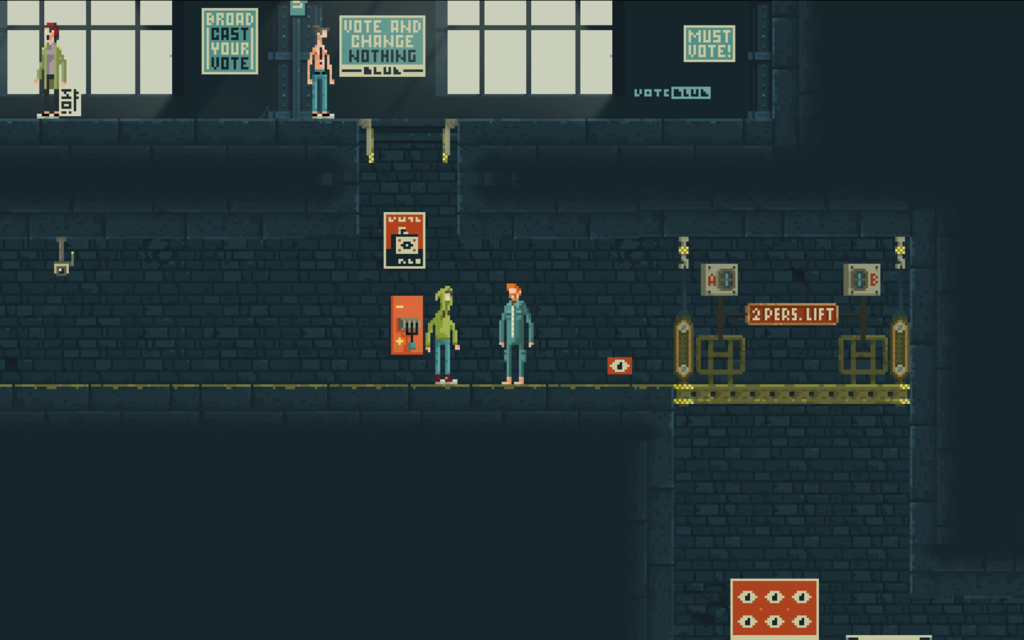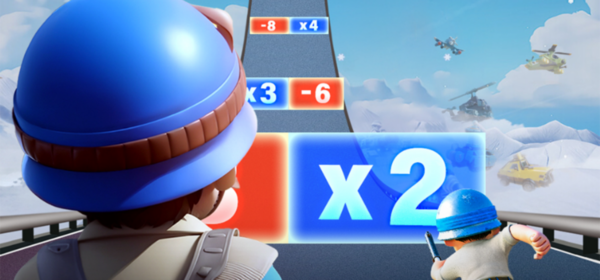How to get two publishers to publish in different regions — Ministry of Broadcast experience
The Ministry of Broadcast studio has found two publishers at once to release its debut game in Asia and in the West. They told the Game World Observer about this and about their approach to the development of story-oriented games. App2Top.ru publishes a translation of the interview.
What kind of game
Ministry of Broadcast is the debut project of the Czech studio of the same name. This is a story-oriented platformer, released on January 30. It takes place in a dystopian country divided in two by a Wall. To get behind the Wall, the player must survive in a reality show hosted by the omniscient and omnipresent Ministry of Broadcasting. The game has traps, “gray” morality, as well as sparkling dark humor in the style of “Monty Python”.
We add that the game was purchased by up to 20 thousand Steam users, according to SteamSpy.
The Ministry of Broadcast development team consists of four people: Petr Škorňok, Dušan Čežek, Sanja Čežek and Petr Melicherik. The interview took place with two of them — Peter Shkoryok and Dusan Chezhek.
The Ascent of the Ministry of Broadcast
Oleg Nesterenko, GWO editor-in-chief: Let‘s start from the beginning. How did the four of you meet and decide to become a studio?
Peter Shkorok: It all started with the Twin Petes studio, which consisted of me and my friend Pete (Peter Melikherik). We’ve been programming for a while, but we’ve always wanted to make games. And we thought, “Hey, as long as we don’t have mortgages, wives and children, this is our last opportunity to become developers. Let’s try to make a dream game.” We started looking for designers and artists, came across good photos of Dusan and Sanya’s creations, and wrote to them. That’s how it all started for us.
Did you already have a specific idea for a future game at that time?
Peter: Yes, we wanted to make a dark world inspired by Orwell’s 1984. It was originally supposed to be a 2D shooter. Our very first prototype was like that. The player had to clear a number of arenas, with each series of fights crowned by a boss battle. As you can see, since then the vector of the game has completely changed.
Dusan Chezhek: The only thing left of the original prototype were the arenas mentioned by Pete. We saved them and made them the basis of the gameplay. We’ve been through a lot of brainstorming sessions, and in the process our game has grown a lot. We started with 50-60 assets, and in the end we got 7200.
As for our background: Sanya and I escaped from the advertising industry. We both graduated from art schools and universities. We were real artists until we started working for an advertising corporation. Everything was fine for a while, but then we just got tired. We wanted to do something different. So we took and opened our own studio Fuchs + Dachs to create art that we like. Now we work only with projects that are interesting to us, which will be important both for us and for our clients.
That’s how the four of us met: Pete and Pete saw our creations, and we got together with them. It’s just that Sanya and I also played video games and eventually wanted to make our own game.
We live in two different cities: Prague and Brno. But after several meetings, we realized that we have similar ideas, a sense of humor, common stories that we want to tell. So we quite naturally merged into the Ministry of Broadcast. We named our new studio that way because the game of the same name brought us together.
Peter: And it seems to me that the first turning point that convinced us that we needed to work together and create a studio came after six months of development. We made a demo to show at conferences. In Brno we attended our second conference — Game Access. Pete and I came, Dusan and Sanya came. Together we demonstrated the game to the audience and at the same time felt like a team. It didn’t seem to us that Dusan and Sanya were working on one part of the game and we were working on another. No, we felt that we were doing a common cause. So they said to themselves: “Let’s make a game together, let’s try to work on it full-time, look for funding.” Because then we developed the game only during non-working hours or on weekends.
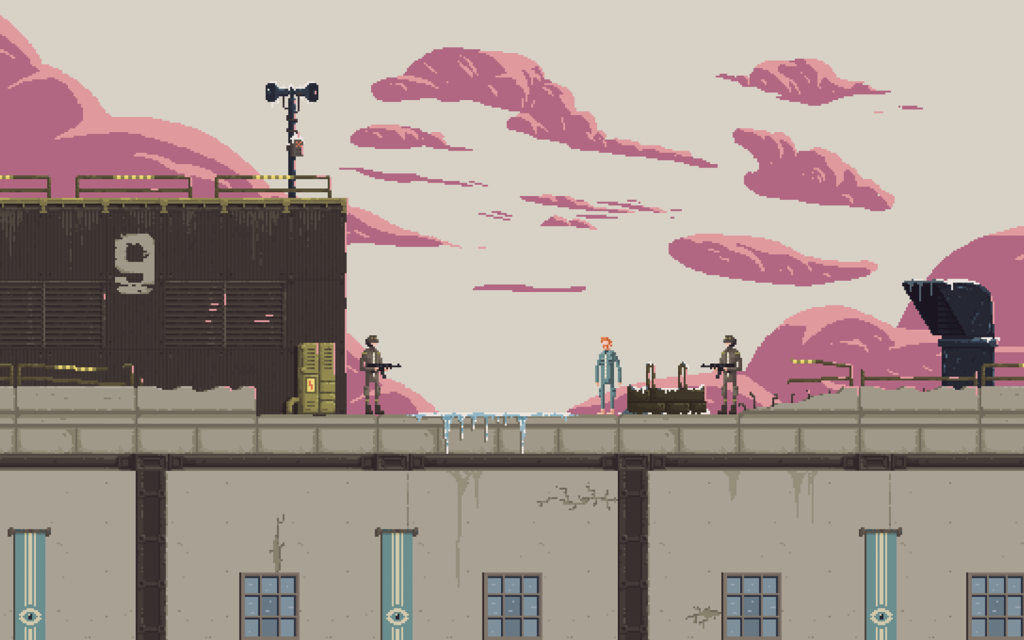
About conferences, publishing and game development in the Czech Republic
Dusan: At Game Access 2018 in Brno, we won in the nomination “Best Gameplay”. This award allowed us to travel to Tokyo soon for the Tokyo Game Show 2019. This was our natural path to big conferences, which gave us a chance to attract publishers and funding.
Peter: We were lucky, and last year we were able to develop full-time. Although no, it’s probably not luck, since we’ve been to so many conferences. We presented ourselves correctly, demonstrated the game to absolutely all interested publishers and tried to make as many acquaintances as possible at any conference. So it’s all about effort, not luck.
We found the Tokyo publisher PLAYSIM and the American Hitcents. They helped us finance the remaining development.
Wow, two publishers at once?
Peter: First we got acquainted with PLAYSIM. They are focused on the Asian market, but we did not immediately agree with them. Negotiations have been going on for almost six months.
In parallel, we met representatives of Hitcents at IndieCade in Los Angeles. They wanted to publish our game and funded us.
During the negotiations, we came to the general opinion that Hitcents are not very experienced when it comes to the Asian market. And that it would be better if the publisher was focused exclusively on this region and understood how everything works in it.
So we decided to sell the game separately in different regions. Hitcents work in Europe, the USA and Australia, PLAYSIM are experts in Asia. It was wiser to divide the markets in order to achieve more sales and more coverage.
And it was good for us that the income comes from several sources. In addition, with two publishers, it is easier to get all the necessary amount for development.
Is there an independent version of Ministry of Broadcast for the Asian market?
Peter: The game was translated into Japanese and Korean, but nothing was changed in it. Oddly enough.
Dusan: However, we will have to make one small change to the Switch version. It is necessary to cover the images of naked breasts. We have a little bit of pixel nudity there, we need to pixelate it even more.
It is necessary — so it is necessary. Now tell those readers who are trying to find at least one publisher: how did you get two at once? You must have had some killer pitching materials.
Dusan: We had one picture with terrible graphics and the inscription: “Our game looks like this. And she will become like that if you give her money.” It was our shortest pitch.
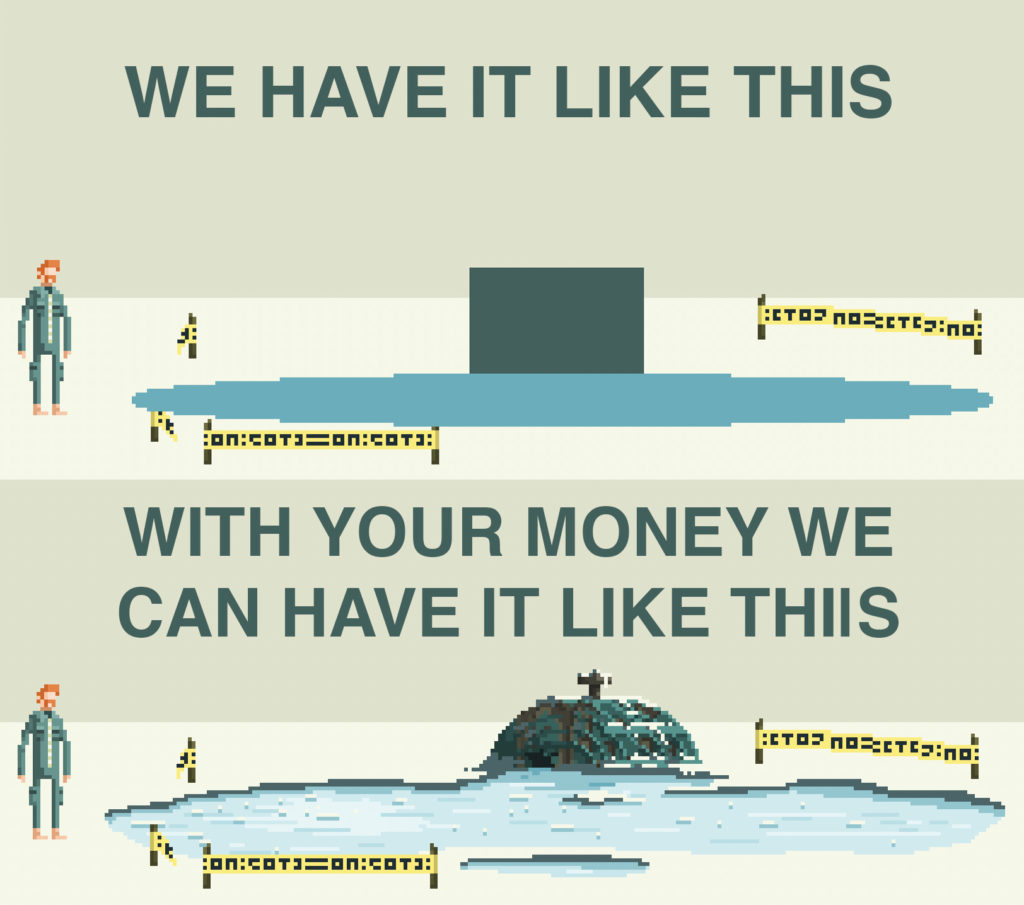
Of course, we prepared a normal presentation, but that picture worked perfectly. She demonstrated the whole essence of our team, because we really like a sarcastic pitch.
We decided that we would just treat pitching with humor and show ourselves as we are. We didn’t want a toxic relationship with publishers, those who would cram their own ideas into the game, which would distort our vision and force us to finish the project by force.
So from the very beginning we treated the meeting with the publisher as a date via Tinder. Do you understand? This is when both sides try to please each other. We have exactly this approach to pitching.
It seems that you didn’t waste any time at indie conferences. The award for the best gameplay at Game Access 2018, the nominations “Best Story”, “Most original game”, “Best desktop Game” at Game Connection 2018 in Paris — and this is not the whole list. John Romero himself praised your performance. Did all this put pressure on you? Didn’t you feel that you had to meet everyone’s expectations?
Peter: We just wanted to make a game that others would want to play. In the end, it is more important when not others are proud of you, but you are proud of yourself.
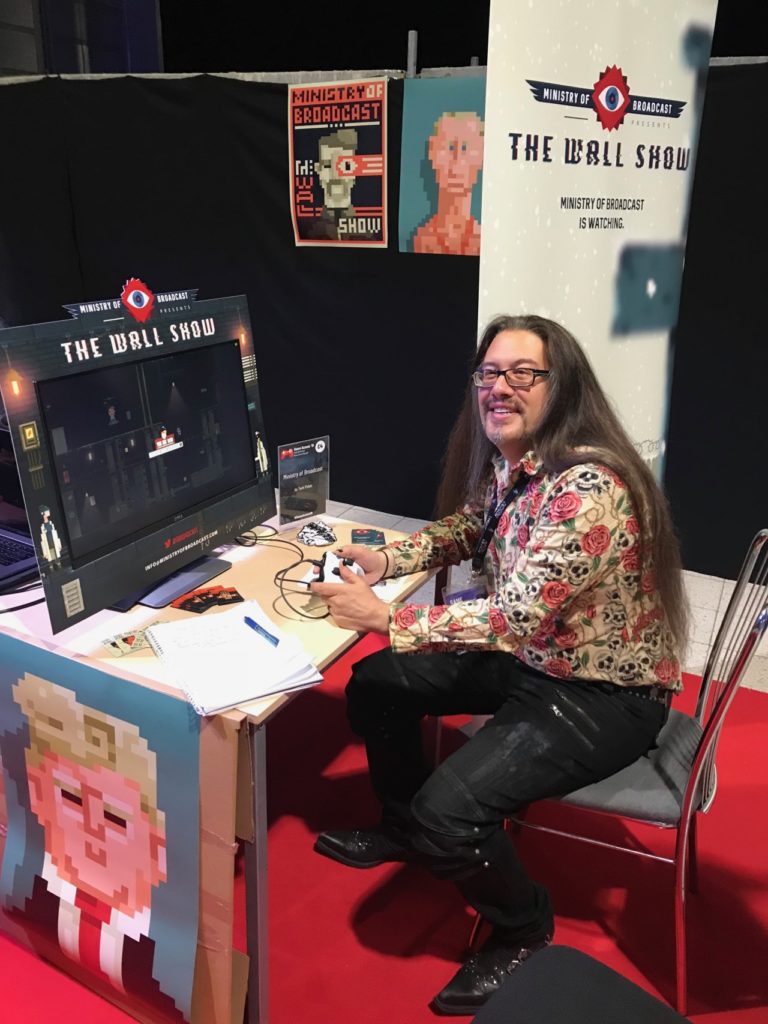
John Romero Plays Ministry of Broadcast on Game Access 2018
Of course, it meant a lot to us that John Romero played our game and he liked it. This gave us a little confidence, because the development was just beginning, we had only the first demo on our hands. But later we didn’t even think about doing everything as expected of us. We focused only on what we love ourselves.
So it’s not so important for you that the game becomes a commercial success? I wonder what your publishers think about it.
Dusan: And we don’t tell them about it.
Peter: We just hope they’re happy.
Dusan: And that brings us back to the “Tinder feed.” It was important for us to find a publisher who understood what we were doing. We consulted with one of our publishers about only one thing: what should be the ending of the game, happy or not. The USA and Europe have their own cultural peculiarities. We are guys from Eastern Europe and grew up on more realistic films, where there is not always a happy ending so beloved by producers. The director himself makes the movie the way he wants.
In the States, however, they are more used to producers who make changes to the film so that it suits a wide audience. So the ending is the only thing we discussed with the publisher. Not in terms of what we can and cannot do, it was not a question at all. It was just necessary to understand which was better: if the game was pretentious in a European way or commercial in an American way. We decided everything else on our own. And we are very glad that the publishers treated the project with such understanding and support.
Now you are a real game studio. How are the responsibilities distributed in the team?
Dusan: We are a very strange game studio. We believe that we don’t need a clear business structure. There are no specific roles in our team. Of course, you can’t close your eyes to the experience of each of us, so Sanya and I are responsible for the art, and Twin Petes is responsible for the technical part. But as for everything else, we hold round tables, discuss all aspects together: gameplay, plot, even sound and music content. We want to hear everyone’s opinion. And, given the small size of the studio, this approach is still working.
What does it feel like to be a studio in the Czech Republic?
Dusan: Oh. You know Amanita Design. This is the best studio in the Czech Republic. They released Machinarium (2009) and many other great games. But the country also makes AAA, for example, Mafia or Kingdom Come: Deliverance. I would say that either pretentious or commercial projects are being created in the Czech Republic — and there is no mixing. Well, unless our game is somewhere in the middle.
So you’re trying to stake out a new niche…
Peter: Only within the Czech Republic. At least we didn’t live in other countries. But we communicate with foreign developers, for example, from Switzerland. It would be much more difficult for us to attract the necessary funds there, because life there is more expensive than in the Czech Republic. Here we pay for accommodation a quarter of the amount that we would have to spend in Switzerland. When you turn to international publishers, they allocate you the same amount as Swiss studios. But in the Czech Republic it is easier to save money for a long time. This is our advantage.
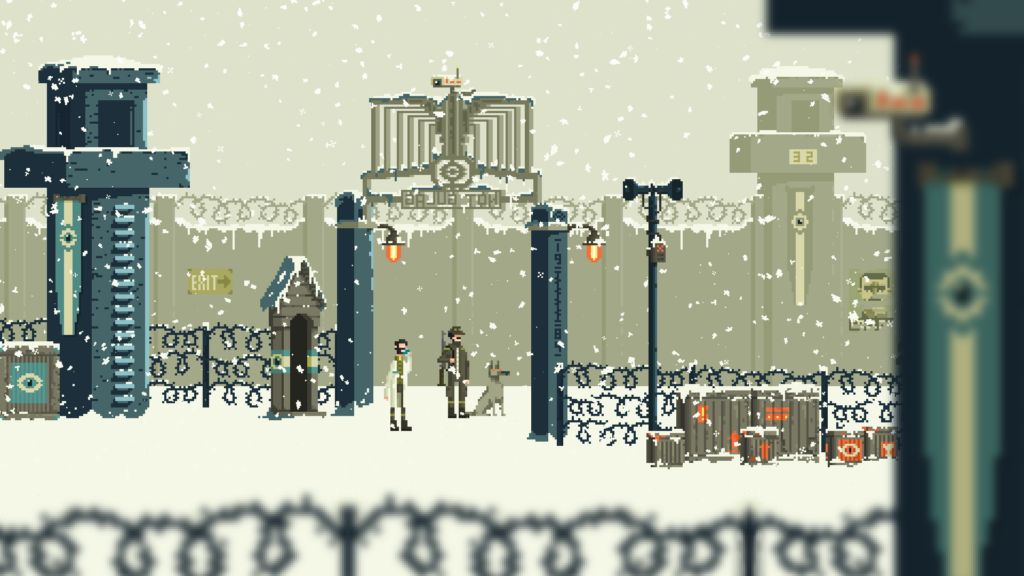
World Ministry of Broadcast
You mentioned that it all started with the history of a country divided by a Wall. How did you get this idea?
Peter: It came from the climate in which we all lived at that time. Yes, even today, things like Brexit happen, don’t they? Something keeps people apart all the time. Immigration is happening. The leaders of the countries decide who to let in, who not to let in. We connected all this with the Berlin Wall built overnight. At first it was an ordinary fence, but over time it turned into a monolithic wall, it grew and grew, and it lasted for many years.
And so we thought: what if the authorities on one side of the Wall make concessions to those who want to cross it? After all, what do the authorities usually say? “No, you can’t leave, we won’t let you cross the border.” But what if they can control the escape? To select those who want to and make a reality show with their participation?
All these thoughts about elitism, about the selection of people are already inspired by the modern political climate. Trump’s wall also contributed to the idea in some way. So is Brexit.
Dusan: Now our PR people and publishers will be happy. They love it when developers bring their own personal experience to the game. Sanya and I were born in Yugoslavia. It looked like a beautiful utopia, but in the 90s a war broke out on its territory, the country was divided. No one asked if you wanted to live here. People just stayed where the war found them. Literally overnight we were cut off from the rest of the world. We suddenly needed visas to travel abroad. And we could only travel for a limited time. Some supply chains have been disrupted. I remember that there was not even gasoline for refueling cars, people waited for three or four days to fill one tank. And the media played a huge role in all this. There was both a real war and an informational one.
We’ve been through it all. We did not seek to recreate this particular experience in the game, but it was quite natural to turn to it. This story echoes the vision of the world in which we now live. We are all connected through social networks, but at the same time we allow ourselves to be monitored, broadcast our lives online, sell ourselves in a reality show. We have never felt so disconnected from each other, while being so connected.
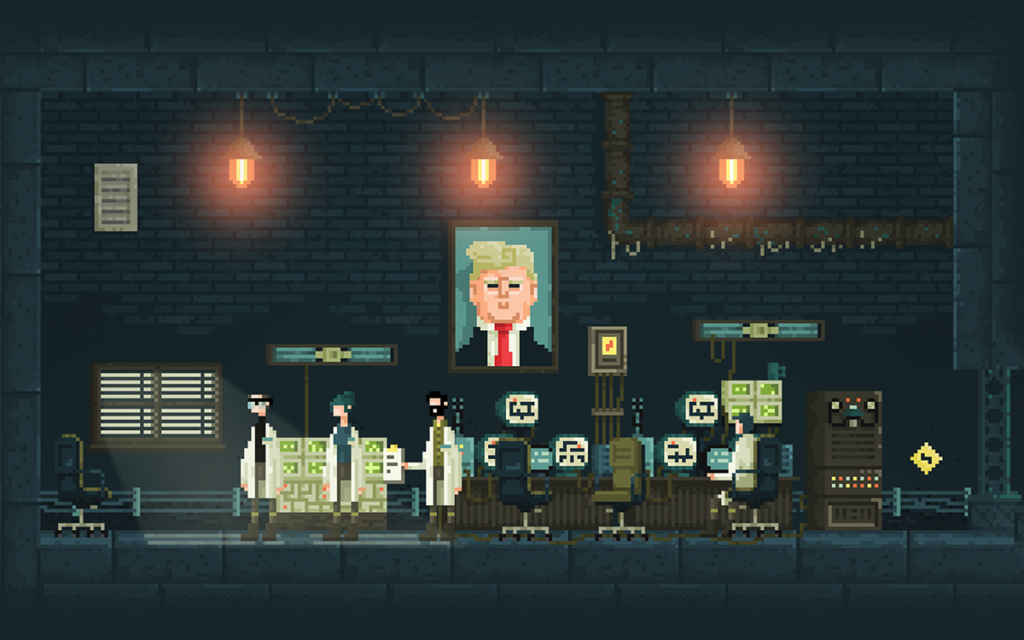
This is exactly the idea we were trying to grasp. Yes, the Trump wall worries everyone who lives in the United States. But in Asia there is North Korea, in Europe there was the Berlin Wall. We are still building walls today, including Brexit and much more. I think people even like to erect them. All cultures have it.
That’s why we called the totalitarian mode in our game simply “Mode”. This is not some specific absolutist state. Even if it is democratic, it does not matter at all. Rid communism or capitalism of its characteristic features, they will still be based on a controlling regime, even if it controls in different ways.
We wanted to unite a capitalist country with absolutism, to create a unique regime based on money and show business. Any regime needs the media to survive. The Ministry of Broadcasting allows you to escape the country if you win a reality show. Such a show highlights what an absurd world we live in, how absurd the media make it, this smokescreen over reality. They never tell the whole truth.
This is what we wanted to convey. The game is playing with you. You don’t know where you are and what’s going on, what kind of world you’re in. You are being chased by a crocodile, then fired at by security. They can do anything to you, just to keep the show going.
Creation of Ministry of Broadcast: level design, management, genre, art, engine
Let’s talk about development.
Peter: The game cycle is divided into days. There are five of them in total. We did every in-game day from scratch, as Dusan and Sanya opposed the reuse of the same assets. Therefore, we sent them separate game blocks for each day, they came up with a new environment and sent it back to us. Sometimes we realized that the blocks no longer fit together because of the difference in the environment. We changed the designs over and over again until the blocks began to fit each other perfectly.
Dusan and Sanya also never consider level design as level design in the understanding of game developers. They are not from the gaming environment, and for them level design is like interior design by architectural artists.
Dusan: We allow mechanics to influence the environment and vice versa. We’ve always been annoyed by games with obvious puzzles. This is when you are thrown into some beautiful place, and there you stumble upon a puzzle that simply does not fit here.
Peter: We didn’t want to insert puzzles for the sake of puzzles. Instead, we tried to create puzzles with meaning that could push the plot in one direction or another. For example, you choose a way to solve a puzzle, and this changes your relationship with other characters.
Oh, I love this! A sacred marriage of plot and gameplay!
Peter: History dictates absolutely everything. It depended on what the genre of the game should be, what the controls would be.
What about the controls?
Peter: One day Peter Melikherik comes to me and says: “Let’s muddy up the management, like in Prince of Persia 1989.” I said to him: “You know, I’m not sure that this is a good idea, now you won’t find such management anywhere.” Everyone somehow got used to a very responsive control scheme, like in Celeste. But then we consulted with Dusan and Sanya, and it turned out that there is some sense in this.
You press a key, but the character moves with a slight delay. So you feel like a kind of puppeteer controlling a puppet. We realized that this perfectly matches the theme of “1984” and Big Brother, because it makes the player himself a Big Brother. He controls the main character, makes him do things that the character will not do himself. The devil is in the details. For example, a character freezes on the edge of a ledge. He doesn’t want to jump—and he won’t jump unless he’s forced to.
We spent the most time developing this feature. We have been finalizing the management for the last two years. And we continue to refine it, we are still trying to improve it.
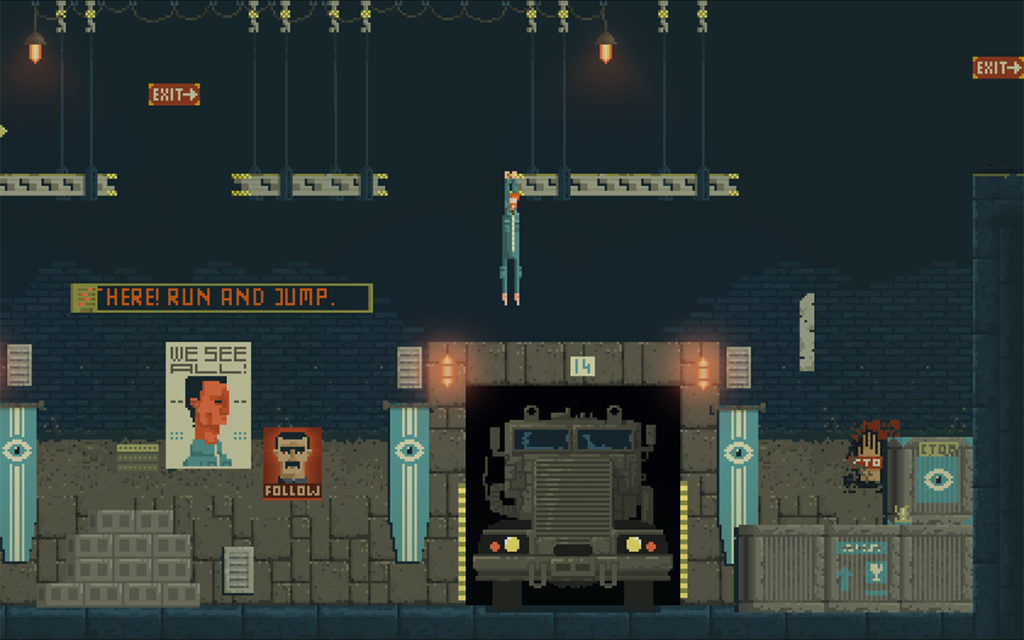
Dusan: Actually, at every conference we attended, the management of the Ministry of Broadcast was slightly different. We tested our iterations on players.
But, in the end, the essence of the idea was that the game rewarded the player with new details of the story. The player must act to advance through the story. And it seems to us that the disclosure of the plot really brings pleasure. A pleasure that we would miss if we simplified the management.
We read a review this morning. Its author claims that the management of the Ministry of Broadcast is a puzzle in itself. This is what we wanted, and the journalist understood it, so the review really encouraged us.
Did you also choose the genre of “platformer” to match the narrative?
Dusan: Yes. We are talking about a system where you are like a mouse in a maze, and you cannot move freely. We wanted to make a number of areas more like the open world, but it only hurt the story. We tried to make the player feel that there is a system that controls his every action. It’s like you have to go to the left and nowhere else. It’s hard to imagine something more linear.
Peter: And any choice that the game gives you does not negate the feeling of total control. The regime controls you, you’re a puppet, you can’t be smarter than it. Our goal was to recreate the feeling of oppression.
We also debated for a long time about whether the action should resemble the classic Prince of Persia with his sword battles. We even made prototypes of such a fighting game, but then we thought that the player might feel more powerful than necessary. And you don’t have to feel powerful, you have to feel like a prisoner. So we abandoned the classic fight and introduced restrictions: for example, to avoid traps, you need to substitute other people.
We also knew from the very beginning that the game didn’t need inappropriate UI elements like a big flashing arrow pointing in the right direction. We decided to fit the user interface into the environment so that all the hints and arrows are inside the level itself. And then we remembered that the same thing was done by the developers of Oddworld: Abe’s Exoddus (1998). So our game is such a strange combination of ideas taken from other cinematic platformers.
Yeah. But didn’t you worry that there are already too many pixel platformers with side-scrolling coming out?
Peter: That’s exactly what bothered. That’s why we decided to make a cinematic platformer. You don’t see them very often, it’s like a separate subgenre. This is the first feature that distinguishes the Ministry of Broadcast. The second is management. Another one is, of course, the art direction chosen by Dusan and Sanya.
Dusan: We tried to use a limited color palette. Combine the brutalist forms of Russian avant-gardism and the Czech glamorous avant-gardism of the 30s. The latter is like those posters with the Swiss Alps for the rich, where everything is pastel, surreal and beautiful. We have combined the aesthetics of these two directions so that the mode in our game does not feel like a threat.
We didn’t want any Soviet red flags. And no Nazi paraphernalia, which is so often taken to demonstrate the absolutist regime. The mode in the Ministry of Broadcast was well promoted. He changed his flags to blue: people like blue, he is very calm. The authorities in the game are trying to hide the fact that they control you. You will feel pressure, but at the same time it will seem to you that the state loves you. We wanted to show this using pixel graphics. There are only eight colors in our color palette, so it was quite difficult to create a background with which the characters would not merge. I think we did it.
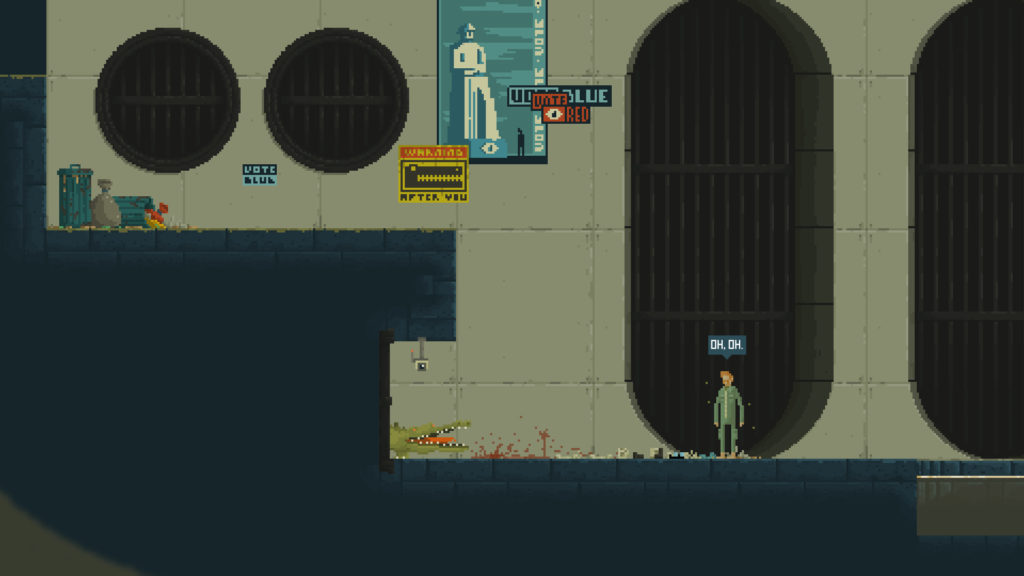
It turned out great. And you did all this on GameMaker: Studio 2, right? Why this particular engine?
Peter: From the very beginning we discussed which engine to take: GameMaker or Unity. Pete and I are experienced programmers, and GameMaker is more considered as an engine for beginners. But then we saw what could be done in GameMaker. Everyone knows about Hyper Light Drift, right? So we decided to squeeze everything we can out of the engine. With him, we planned to get to GameMaker Showcase and stand out on this platform, instead of being the authors of one of the whole mass of Unity games.
Actually, that was the idea. But the overall experience with GameMaker from the very beginning was quite pleasant. This allowed us to make a prototype very quickly. Of course, we were experienced programmers, but we had never coded games before. In addition, our game didn’t really need shaders and visual effects. Dusan did everything according to the old canons, with particles and all that.
The most difficult thing was at the final stage of development, when the project grew to a very large size. There were thousands of assets in the game, and just launching GameMaker took minutes. I think we really squeezed everything out of him. But for our game, he came up perfectly.
So you knew when to stop.
Dusan: Exactly. 7200 assets is the ceiling.
Peter: The engine proved to be perfect also when porting the game to the Nintendo Switch. Which in itself is surprising, because the ports on the Switch were not in use at that time. The developers have just started beta testing this process. But everything worked fine for us.
After the release
Your game launched on January 30th. You probably spent the whole day on social networks?
Peter: Oh, yes. I Googled everything I could until I forced myself to turn off my phone and just go somewhere.
Mostly people praise the game. Were there any negative reviews?
Peter: Well, we received negative reviews even before the release, because people associated the Wall from the game with the Trump wall. But we were ready for it. In addition, to be honest, we have not encountered the hatred of the players, have we, Dusan?
Dusan: Yes, that’s right. For the most part, the reviews were good. Of course, it is difficult for some players to adapt to management. But we expected this too.
Peter: Yes. Nowadays, players expect all kinds of help in games, including the “Story Only” difficulty mode.
Dusan: And, as Pete said before, we are still debating about management. For example, is it worth making a patch for people who want to reconfigure the assignment of keys. We will not change the management completely, as it is related to the narrative. But we also have to think about a new generation of players who like more responsive management.
What’s going on in the studio right now?
Dusan: Now we need to finish the Switch version. It will be released in early spring. The publisher and I are also preparing a boxed edition. The game will have a collector’s edition with a steel box and a standard physical copy. And we are already discussing our next project, which will be a new step for the studio.
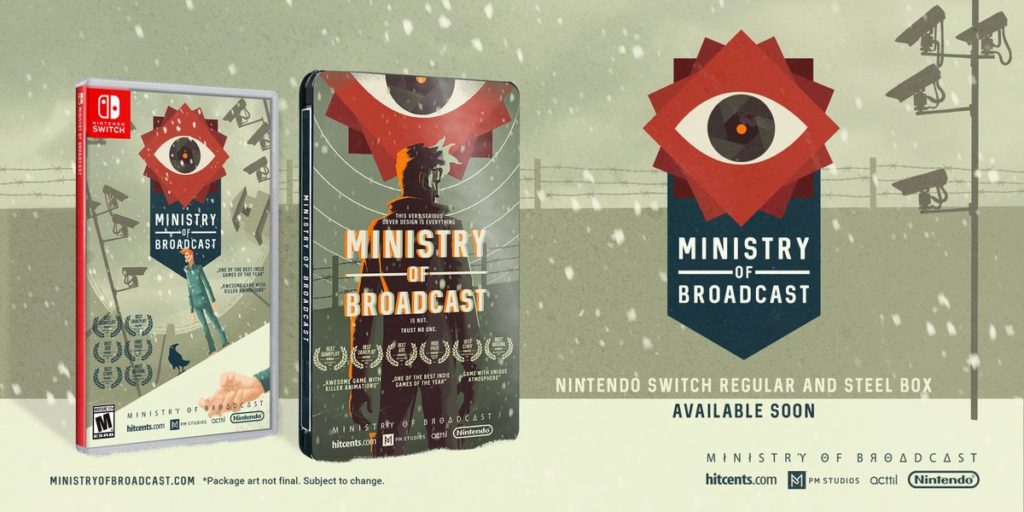
And I thought that the next logical step was how to celebrate the release…
Dusan: Yes, you know… We are all either young parents here, or we are expecting an addition from day to day. So no, we don’t want to drink. We want to sleep.
Peter: There are too many releases at the same time.
Okay, then what are you planning to do now?
Dusan: We are discussing what the world should look like from the other side of the Wall. This is one of the ideas. In the game, it is presented as an ideal place to live. But is it so?
So it’s not the final yet? Should we wait for the DLC? Or Ministry of Broadcast 2?
Dusan: Maybe we will do either this or that. Or maybe a completely new project, and then we’ll go back to the Ministry of Broadcast, if the players like it. Or we’ll just take a short break. The game came out yesterday, and we are all still emotionally exhausted. But there is still a release on Switch, where there is a completely different audience, a different PR, marketing, etc. So we’d like to survive that, too.
Sounds like a new level in your game. Well, good luck to you. Or, as they say in one platformer, have a good show!
Dusan and Peter: Have a good show!
